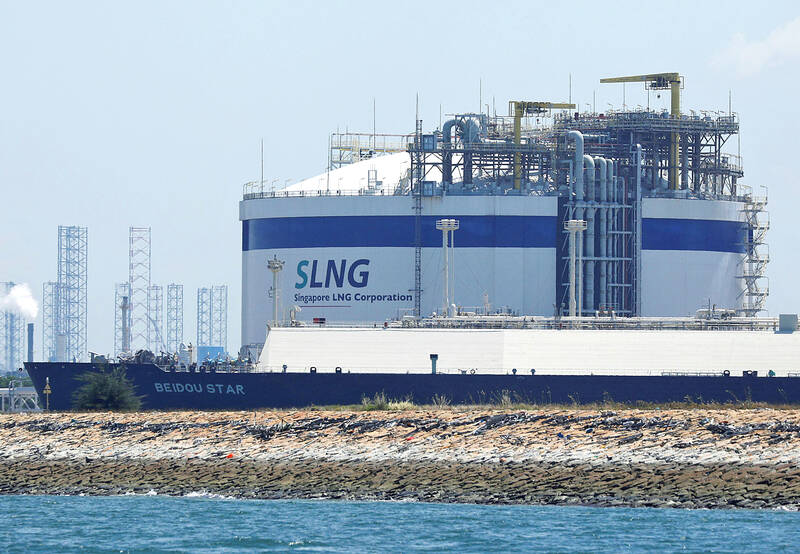Southeast Asia is on track to vastly expand its gas-fired power plant and liquefied natural gas (LNG) import capacity, threatening its green energy transition, a report said yesterday.
The region’s plans project a doubling of gas-fired power capacity and an 80 percent increase in LNG import capacity, said Global Energy Monitor (GEM), a US-based non-governmental organization.
Natural gas emits less carbon dioxide than most other fossil fuels, and so it is often considered a “transition fuel” that can help economies reduce emissions without sacrificing growth, but methane leaks from the gas industry are a said to be a key component of climate change.

Photo: Reuters
The International Energy Agency (IEA) has said that LNG should only have a “limited role” in moving away from coal.
“Beating coal on environmental grounds sets a low bar for natural gas, given there are lower-emissions and lower-cost alternatives to both fuels,” the IEA said in 2019.
Leading the LNG expansion in the region are Vietnam, the Philippines, Indonesia and Thailand, GEM said.
The area already has enough large-scale solar and wind capacity in development to cover nearly two-thirds of the projected increase in energy demand by 2030, GEM said.
However, renewables potential is unevenly distributed across the region, with some countries better-placed to harness wind or solar than others, it added.
Grid infrastructure regionally is also a barrier, with upgrades needed to facilitate renewable integration, it said.
That might make LNG appear more attractive, particularly where coal or diesel power plants can be converted, it said.
However, “ramping up gas production is not a long-term solution,” said Warda Ajaz, project manager for GEM’s Asia Gas Tracker. “Meeting demand with cost-effective, renewable sources insulates the region from volatile gas prices and is a greener path forward.”
The report warns that international finance is encouraging gas capacity expansion over renewables, in part by offering countries such as Indonesia and Vietnam money to convert plants to LNG.
“Most of the in-development gas infrastructure capacity in Southeast Asian countries has not yet entered the construction phase,” the report said. “There is still time to change course and divert investments toward renewable resources and regional grid integration.”

Kehinde Sanni spends his days smoothing out dents and repainting scratched bumpers in a modest autobody shop in Lagos. He has never left Nigeria, yet he speaks glowingly of Burkina Faso military leader Ibrahim Traore. “Nigeria needs someone like Ibrahim Traore of Burkina Faso. He is doing well for his country,” Sanni said. His admiration is shaped by a steady stream of viral videos, memes and social media posts — many misleading or outright false — portraying Traore as a fearless reformer who defied Western powers and reclaimed his country’s dignity. The Burkinabe strongman swept into power following a coup in September 2022

‘FRAGMENTING’: British politics have for a long time been dominated by the Labor Party and the Tories, but polls suggest that Reform now poses a significant challenge Hard-right upstarts Reform UK snatched a parliamentary seat from British Prime Minister Keir Starmer’s Labor Party yesterday in local elections that dealt a blow to the UK’s two establishment parties. Reform, led by anti-immigrant firebrand Nigel Farage, won the by-election in Runcorn and Helsby in northwest England by just six votes, as it picked up gains in other localities, including one mayoralty. The group’s strong showing continues momentum it built up at last year’s general election and appears to confirm a trend that the UK is entering an era of multi-party politics. “For the movement, for the party it’s a very, very big

ENTERTAINMENT: Rio officials have a history of organizing massive concerts on Copacabana Beach, with Madonna’s show drawing about 1.6 million fans last year Lady Gaga on Saturday night gave a free concert in front of 2 million fans who poured onto Copacabana Beach in Rio de Janeiro for the biggest show of her career. “Tonight, we’re making history... Thank you for making history with me,” Lady Gaga told a screaming crowd. The Mother Monster, as she is known, started the show at about 10:10pm local time with her 2011 song Bloody Mary. Cries of joy rose from the tightly packed fans who sang and danced shoulder-to-shoulder on the vast stretch of sand. Concert organizers said 2.1 million people attended the show. Lady Gaga

SUPPORT: The Australian prime minister promised to back Kyiv against Russia’s invasion, saying: ‘That’s my government’s position. It was yesterday. It still is’ Left-leaning Australian Prime Minister Anthony Albanese yesterday basked in his landslide election win, promising a “disciplined, orderly” government to confront cost-of-living pain and tariff turmoil. People clapped as the 62-year-old and his fiancee, Jodie Haydon, who visited his old inner Sydney haunt, Cafe Italia, surrounded by a crowd of jostling photographers and journalists. Albanese’s Labor Party is on course to win at least 83 seats in the 150-member parliament, partial results showed. Opposition leader Peter Dutton’s conservative Liberal-National coalition had just 38 seats, and other parties 12. Another 17 seats were still in doubt. “We will be a disciplined, orderly